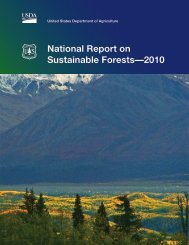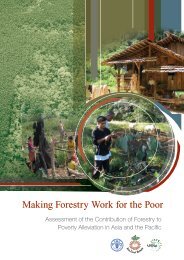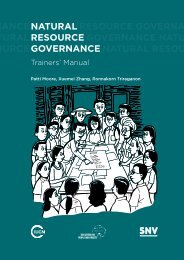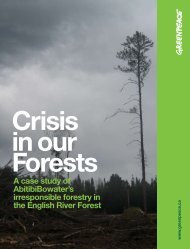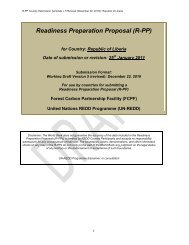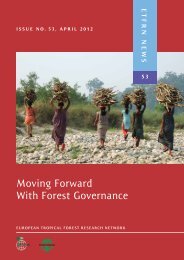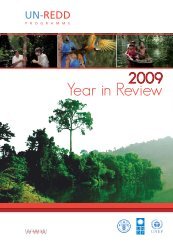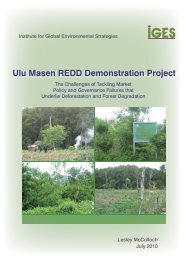pdf 1242 KByte - JIKO
pdf 1242 KByte - JIKO
pdf 1242 KByte - JIKO
Create successful ePaper yourself
Turn your PDF publications into a flip-book with our unique Google optimized e-Paper software.
Policy Paper: Assessing prerequisites for market-based REDD+ activities 21<br />
of the highest political class can be particularly helpful to strike this balance, especially in countries with<br />
weak institutional structures. The decision on whether establishing new institutions for MRV or delegating<br />
REDD+ monitoring to existing bodies is more advisable in terms of effectiveness and efficiency will have to<br />
be decided on a country per country basis following a thorough analysis of the national situation.<br />
Forest tenure and carbon rights have important implications on equity and political legitimacy of REDD+<br />
activities, particularly if the integration of REDD+ into carbon markets is being considered. As has been<br />
shown, clarification of tenure is a prerequisite for protecting forest-dependent peoples from possible adverse<br />
effects of REDD+ activities and represents the basis for a participatory approach. More generally, recognizing<br />
the rights of indigenous peoples and forest dependent communities is essential for achieving ”local<br />
credibility” and support (Anderson 2011). While necessity of assigning carbon rights may depend on the<br />
particular design of the national system, dividing carbon ownership from land tenure poses additional risks to<br />
equity which have to be eliminated or at least reduced.<br />
However, establishing national standards and overseeing safeguards will also be essential in more general<br />
terms. Overall political legitimacy can be significantly increased through stakeholder involvement and<br />
achieving of equity as well as co-benefits effects can be maximized. Experiences however show that countries<br />
are still far from meeting the requirements while the experiences of UN-REDD and FCPF show that<br />
appropriate participation of forest dependent communities is challenging.<br />
3.3 Policy readiness<br />
Technical readiness as well as institutional and legal readiness encompasses only parts of the prerequisites<br />
needed to implement REDD+ activities. Since REDD+ is a mechanism driven by actors at the national level,<br />
a strong commitment of governments in REDD+ countries is pivotal. The identification of the underlying<br />
causes of deforestation and forest degradation, the selection of the policy instruments best suited for the<br />
country specific situation as well as the establishing of a mode for channelling international revenues and<br />
benefit sharing are pivotal elements of this policy readiness.<br />
3.3.1 Identifying drivers of deforestation<br />
Understanding deforestation and identifying its drivers lies at the heart of any attempt to reducing forest<br />
emissions and increasing removals (negative emissions). Causes of deforestation are not only diverse but<br />
also spread across several levels. Angelsen (2009b) distinguishes between three different layers. At the lowest<br />
level (level 1) are the agents that induce the land-use change leading to forest degradation and deforestation.<br />
The main agents are large companies clearing land for agricultural use, cash crop smallholders and subsistence<br />
farmers practicing shifting cultivation. Their behaviour is influenced by decision parameters of an<br />
intermediate level (level 2), such as market access and commodity prices, representing the direct causes of<br />
deforestation. These are in turn affected by the underlying causes of deforestation located at a superordinate<br />
level (level 3): macrovariables and national as well as international policies (Angelsen 2009b).<br />
To properly tackle deforestation, governments will have to identify its main drivers and relate them to the<br />
specific national situation. With the causes of deforestation and forest degradation in most countries being<br />
manifold, measures to reduce related activities will have to go beyond mere changes in the forestry sector<br />
and changes will have to be induced in other fields, such as agriculture and other economic sectors. While<br />
Nicolas Kreibich, Christof Arens and Wolfgang Sterk<br />
Wuppertal Institute




